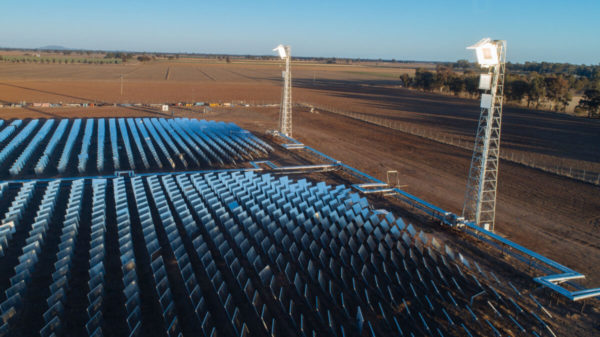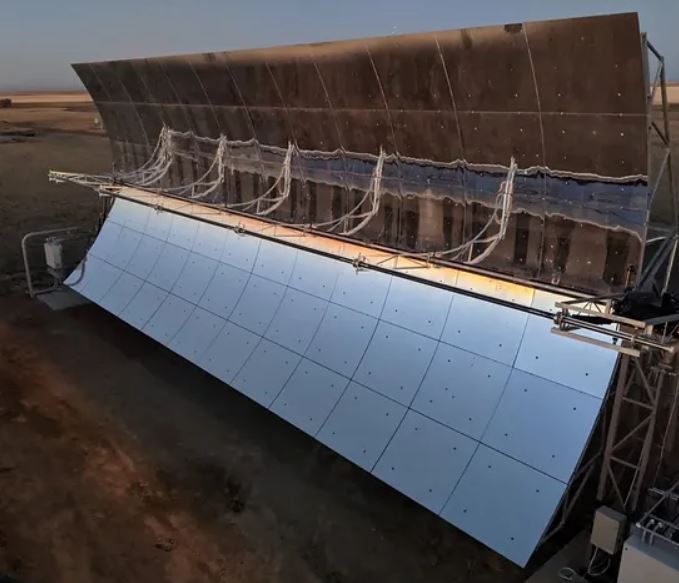Australian renewables company Vast Solar is part of a consortium that will receive $3.67 million (USD 2.3 million) from the U.S. Department of Energy (DOE) to advance the development of next-generation concentrating solar-thermal power (CSP) technologies for use in industrial settings.
The funding is part of USD 24 million in grants awarded by the DOE to advance CSP technologies, which use mirrors to concentrate the sun’s energy in the form of high-temperature heat which is then used to generate synchronous and fully dispatchable power for electricity production and industrial processing.
The grant has been awarded to a consortium led by US-based renewable technology company Solar Dynamics, and including Vast Solar, to develop and test designs of molten salt thermal energy storage tanks to improve the performance of CSP plants.
Vast Solar chief executive Craig Wood said he expects the funding will help fast track the development of CSP technology which can generate clean, dispatchable power as part of an integrated low-cost energy system.
“Funding from the US government is going to accelerate the development of the technology,” he said. “We expect to see rapid deployment of plants in sunny states throughout the US, helping the country achieve its decarbonisation goals.”
The funding comes as Vast Solar eyes potential projects in the US on the back of strong investment incentives following the introduction of the Inflation Reduction Act.
Wood said the Act “changes the game for CSP in the US” and is expected to drive energy cost reductions of up to 50% for the Sydney-based company’s modular tower CSP plants.

Image: Vast Solar
Unlike traditional CSP technology which uses molten salt both as a heat transfer and for storage, Vast Solar has developed technology that uses sodium for heat transfer and molten salt for on-demand storage, both of which create steam to drive a turbine. The technology allows plants to be configured with 4 to 16 hours of storage and generators of up to 500 MW.
The technology is on show at Jemalong in New South Wales where a 1 MW pilot plant, which was constructed adjacent to a 50 MW solar PV project, has been delivering electricity to the grid since early 2018. It is also scheduled for deployment at Vast Solar’s 30 MW utility scale power plant near Port Augusta in South Australia. The company has also announced plans to develop a 50 MW baseload solar hybrid plant at Mount Isa in Queensland.
US Secretary of Energy Jennifer Granholm said the latest funding round will further advance the development and deployment of solar energy technologies and help support President Joe Biden’s goal of achieving a net-zero economy by 2050.
“Solar-thermal technologies provide us with a significant opportunity to upgrade and reduce emissions of industrial plants across the nation while meeting America’s energy needs with reliable, around the clock power generation,” she said. “DOE’s investments will drive the innovation necessary to build out a clean energy economy and meet our climate goals while diversifying the sources of dependable and readily available clean energy.”
This content is protected by copyright and may not be reused. If you want to cooperate with us and would like to reuse some of our content, please contact: editors@pv-magazine.com.









By submitting this form you agree to pv magazine using your data for the purposes of publishing your comment.
Your personal data will only be disclosed or otherwise transmitted to third parties for the purposes of spam filtering or if this is necessary for technical maintenance of the website. Any other transfer to third parties will not take place unless this is justified on the basis of applicable data protection regulations or if pv magazine is legally obliged to do so.
You may revoke this consent at any time with effect for the future, in which case your personal data will be deleted immediately. Otherwise, your data will be deleted if pv magazine has processed your request or the purpose of data storage is fulfilled.
Further information on data privacy can be found in our Data Protection Policy.